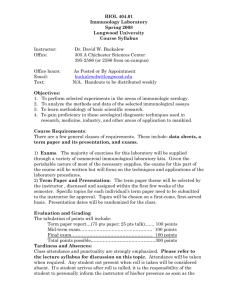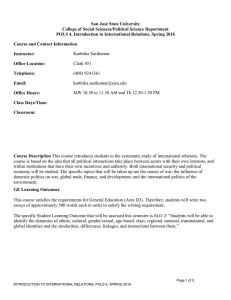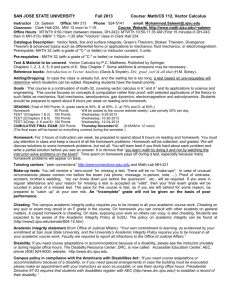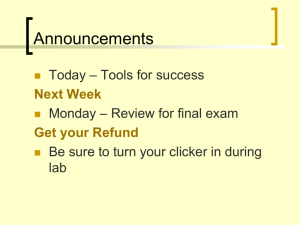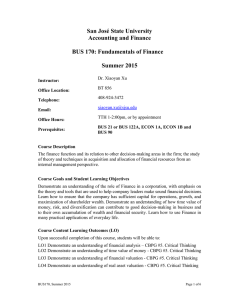POLS 114 Introduction to Public Administration, Spring 2016
advertisement
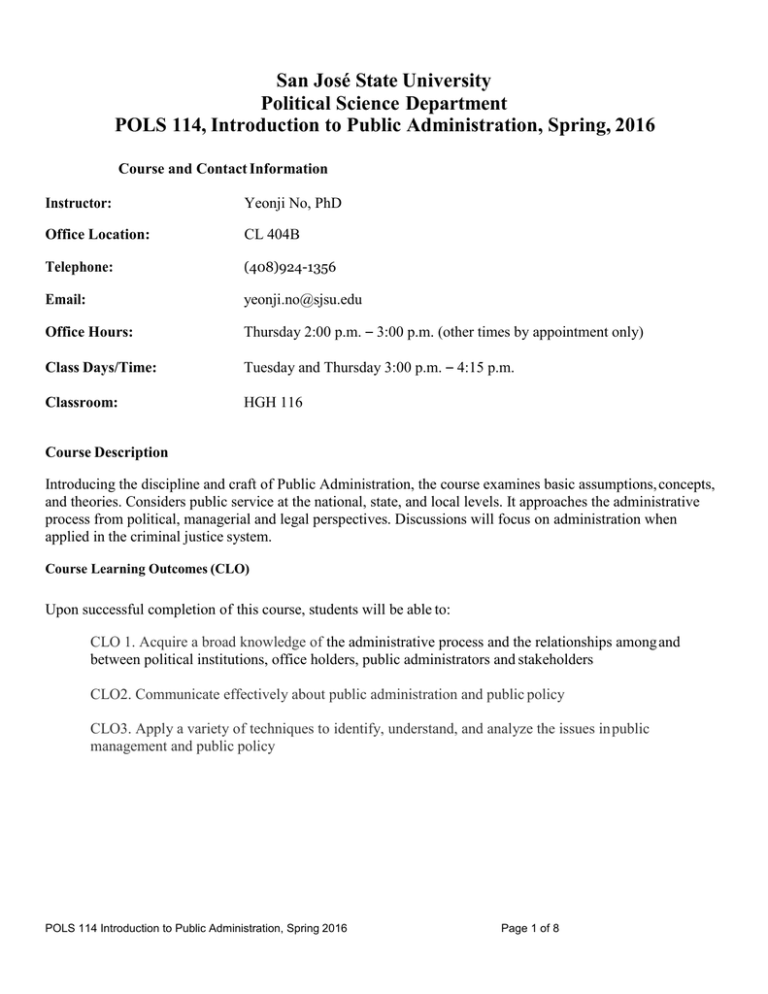
San José State University Political Science Department POLS 114, Introduction to Public Administration, Spring, 2016 Course and Contact Information Instructor: Yeonji No, PhD Office Location: CL 404B Telephone: (408)924-1356 Email: yeonji.no@sjsu.edu Office Hours: Thursday 2:00 p.m. – 3:00 p.m. (other times by appointment only) Class Days/Time: Tuesday and Thursday 3:00 p.m. – 4:15 p.m. Classroom: HGH 116 Course Description Introducing the discipline and craft of Public Administration, the course examines basic assumptions, concepts, and theories. Considers public service at the national, state, and local levels. It approaches the administrative process from political, managerial and legal perspectives. Discussions will focus on administration when applied in the criminal justice system. Course Learning Outcomes (CLO) Upon successful completion of this course, students will be able to: CLO 1. Acquire a broad knowledge of the administrative process and the relationships among and between political institutions, office holders, public administrators and stakeholders CLO2. Communicate effectively about public administration and public policy CLO3. Apply a variety of techniques to identify, understand, and analyze the issues in public management and public policy POLS 114 Introduction to Public Administration, Spring 2016 Page 1 of 8 Required Texts/Readings Textbook Donald F. Kettl. Politics of Administrative Process - 6th edition. Congressional Quarterly. ISBN: 978- 1483332932 Course Requirements and Assignments 1. Exams (50%) There will be one mid-term exam (worth 20%) and one final exam (worth 20%). The midterm exam will cover all texts, lectures, and readings from Chapter 1 to Chapter 7. The final exam will cover all texts, lectures, and readings from Chapter 8 to Chapter 14 No make-up exam will be allowed except a medical or family emergency. 2. Quiz (20%) Students will have four quizzes to check whether students understand the components and theories of public administration. The quizzes will be composed of multiple-choice questions. Therefore, bring your scantron. As an incentive to show up for class (and on time), I will frequently give quizzes during the first twenty minutes of class. No make-up quizzes will be given for late comers or absentees. 3. Team Project Presentation (15%) Students will be assigned into teams of 3-4 students. Each team is required to analyze and prepare an in-depth organizational analysis on a public sector organization of your choice. Using tools and materials covered in this course, students introduce us the organization and diagnose the organization. You may indicate organizational problems contributing to the program failure and make appropriate recommendations. Pre-approval is required before beginning to work. You need to set up an appointment with the instructor with a one-paragraph description of your project by March 24. Your analysis should include the following components: a. An executive summary (1 paragraph) b. Description of the program or policy identified in your research c. Organizational analysis/ organizational sources of the problems (including clear, in-depth explication and application of course materials of your choice). For the presentation, Powerpoint and handouts are required on the date of presentation. Your presentation should include all of your analysis, and it should be well articulated. You also need to be well-prepared for the questions from the audience. Each presentation will last 10 minutes, with 5 more minutes for questions & answers. All members should participate in the presentation. Bring the presentation slides in a flash drive to the class. (Laptop is not allowed.) The presentation slides should be uploaded to Canvas by 10:00pm, the day before the presentation. Team members will get the same grade. POLS 114 Introduction to Public Administration, Spring 2016 Page 2 of 8 4. Class contribution (10%) Students should actively participate in class discussions. Cold calls: The instructor will cold call students to answer questions. Your response to such calls will be factored into your class contribution grade. Absence from class will adversely affect your class contribution grade. No disruptive behavior in class. - - Late Arrival and Early Departure Coming late and leaving early are not professional and will adversely affect your class participation grade. The link to the University Policy about disruptive behavior: http://www.sjsu.edu/studentconduct/facultyandstaff/Managing_Di sruptive_Behaviors/index.html. Students are required to stay for the duration of an entire class period. Travel is not a legitimate excuse for absence from class. Students will be evaluated based on their ability to understand and apply assigned reading materials to class discussion. All students start the semester with 5 points – out of 10 points - for participation. Contribution to class discussion will raise this grade. Habitual absence from class and disrupting class (i.e., coming late, leaving early, talking, text-messaging, checking the Internet, etc.) will reduce this grade, possibly to 0. Each student is expected to provide opinions and comments in a respectful manner. University policy F69-24 at http://www.sjsu.edu/senate/docs/F69-24.pdf states, “Students should attend all meetings of their classes, not only because they are responsible for material discussed therein, but because active participation is frequently essential to insure maximum benefit for all members of the class. Attendance per se shall not be used as a criterion for grading.” 5. Group Member Peer Review (5%) To avoid the free rider problem, where some team members contribute little to the team projects, team members will evaluate one another’s contribution to their group performance. The average score of team members’ evaluations will be a student’s “peer-evaluation” grade. Failure to give a peer review will result in ZERO points. You will evaluate the effectiveness of other members of your team. The peer evaluation (5%) is done online and due at the last class session. Fire a Team Member In rare cases, if a team member consistently fails to cooperate with other team members, others can fire him/her on the condition that they arrive at a unanimous decision AND the timing is prior to week 14. The fired member has to finish the team project on his/her own. POLS 114 Introduction to Public Administration, Spring 2016 Page 3 of 8 Grading Policy Assignment Mid-term Exam Final Exam Quiz Team Project Presentation Class Contribution Peer Evaluation Total Grading Scale 98% and above 93%-97.99% 90%-92.99% 87%-89.99% 83%-86.99% 80%-82.99% 77%-79.99% A+ A AB+ B BC+ Percentage of Grade 25% 25% 20% 15% 10% 5% 100% 73%-76.99% 70%-72.99% 67%-69.99% 63%-66.99% 60%-62.99% Below 60% C CD+ D DF **Penalty for late or missed work: Missed exams and quizzes cannot be made up, except by permission of the instructor, Department Chair or designee. Failure to take midterm exam result in ‘F’ grade. Classroom Protocol Turn off your cell phones and put them away. Students are not allowed to use computers in class. Failure to comply with the policies will lead to penalty on your class participation grades. POLS 114 Introduction to Public Administration, Spring 2016 Page 4 of 8 University Policies General Expectations, Rights and Responsibilities of the Student As members of the academic community, students accept both the rights and responsibilities incumbent upon all members of the institution. Students are encouraged to familiarize themselves with SJSU’s policies and practices pertaining to the procedures to follow if and when questions or concerns about a class arises. To learn important campus information, view University Policy S90–5 at http://www.sjsu.edu/senate/docs/S90-5.pdf and SJSU current semester’s Policies and Procedures, at http://info.sjsu.edu/static/catalog/policies.html. In general, it is recommended that students begin by seeking clarification or discussing concerns with their instructor. If such conversation is not possible, or if it does not address the issue, it is recommended that the student contact the Department Chair as the next step. Dropping and Adding Students are responsible for understanding the policies and procedures about add/drop, grade forgiveness, etc. Add/drop deadlines can be found on the current academic year calendars document on the Academic Calendars webpage at http://www.sjsu.edu/provost/services/academic_calendars/. The Late Drop Policy is available at http://www.sjsu.edu/aars/policies/latedrops/policy/. Students should be aware of the current deadlines and penalties for dropping classes. Information about the latest changes and news is available at the Advising Hub at http://www.sjsu.edu/advising/. Consent for Recording of Class and Public Sharing of Instructor Material University Policy S12-7, http://www.sjsu.edu/senate/docs/S12-7.pdf, requires students to obtain instructor’s permission to record the course and the following items to be included in the syllabus: “Common courtesy and professional behavior dictate that you notify someone when you are recording him/her. You must obtain the instructor’s permission to make audio or video recordings in this class. Such permission allows the recordings to be used for your private, study purposes only. The recordings are the intellectual property of the instructor; you have not been given any rights to reproduce or distribute the material.” o It is suggested that the greensheet include the instructor’s process for granting permission, whether in writing or orally and whether for the whole semester or on a class by class basis. o In classes where active participation of students or guests may be on the recording, permission of those students or guests should be obtained as well. “Course material developed by the instructor is the intellectual property of the instructor and cannot be shared publicly without his/her approval. You may not publicly share or upload instructor generated material for this course such as exam questions, lecture notes, or homework solutions without instructor consent.” POLS 114 Introduction to Public Administration, Spring 2016 Page 5 of 8 Academic integrity Your commitment, as a student, to learning is evidenced by your enrollment at San Jose State University. The University Academic Integrity Policy S07-2 at http://www.sjsu.edu/senate/docs/S07-2.pdf requires you to be honest in all your academic course work. Faculty members are required to report all infractions to the office of Student Conduct and Ethical Development. The Student Conduct and Ethical Development website is available at http://www.sjsu.edu/studentconduct/. Campus Policy in Compliance with the American Disabilities Act If you need course adaptations or accommodations because of a disability, or if you need to make special arrangements in case the building must be evacuated, please make an appointment with me as soon as possible, or see me during office hours. Presidential Directive 97-03 at http://www.sjsu.edu/president/docs/directives/PD_1997-03.pdf requires that students with disabilities requesting accommodations must register with the Accessible Education Center (AEC) at http://www.sjsu.edu/aec to establish a record of their disability. POLS 114 Introduction to Public Administration, Spring 2016 Page 6 of 8 Tentative course calendar including assignment due dates *The instructor reserves the right to alter course content and adjust the pace in order to accommodate class progress, current events, and unforeseen developments. Any changes to this schedule will be announced ahead of time in class and on Canvas. Course Schedule Week Date Topics, Readings, Assignments, Deadlines 1 Jan 28 Introduction of the Class 1 Feb 2 Chapter 1- Accountability 2 Feb 4 Chapter 2- What Government Does – And How it Does it 2 Feb 9 Chapter 2- What Government Does – And How it Does it 3 Feb 11 Chapter 3 – What is Public Administration 3 Feb 16 Chapter 3- What is Public Administration 4 Feb 18 Chapter 4- Organizational Theory 4 Feb 23 Chapter 4- Organizational Theory 5 Feb 25 Chapter 5 – Executive Branch 1st Quiz (From Chapter 1- Chapter 4) 5 Mar 1 Chapter 5 – Executive Branch 6 Mar 3 Chapter 6 - Organizational Problems 6 Mar 8 Chapter 6 - Organizational Problems 7 Mar 10 Chapter 7- Administrative Reform 7 Mar 15 2nd Quiz (Chapter 5- Chapter 7th) Chapter 8 – The Civil Service 8 Mar 17 NO CLASS- Conference 8 Mar 22 Midterm Exam (From Chapter 1- Chapter 7) 9 Mar 24 Chapter 8 – The Civil Service 9 Mar 29 NO CLASS - SPRING BREAK 10 Mar 31 NO CLASS- SPRING BREAK 10 Apr 5 Chapter 9 – Human Capital 11 Apr 7 Chapter 9 – Human Capital 11 Apr 12 Chapter 10 – Decision Making 12 Apr 14 Chapter 10 – Decision Making 12 Apr 19 Chapter 11- Budgeting – 3rd Quiz (From Chapter 8- Chapter 10) POLS 114 Introduction to Public Administration, Spring 2016 Page 7 of 8 13 Apr 21 Chapter 11- Budgeting 13 Apr 26 Chapter 12 – Implementation 14 Apr 28 Chapter 12 – Implementation 14 May 3 Chapter 13 - Regulation and the Court 15 May 5 Chapter 14- Administrative Accountability, Effectiveness and Politics 15 May 10 4th Quiz (From Chapter 11 to Chapter 14) Team Presentation 16 May 12 Team Presentation Final Exam May 23 Final Exam (Chapter 8 to Chapter 14) Monday, May 23 1445-1700 POLS 114 Introduction to Public Administration, Spring 2016 Page 8 of 8 Week Date Topics, Readings, Assignments, Deadlines POLS 114 Introduction to Public Administration, Spring 2016 Page 9 of 8


